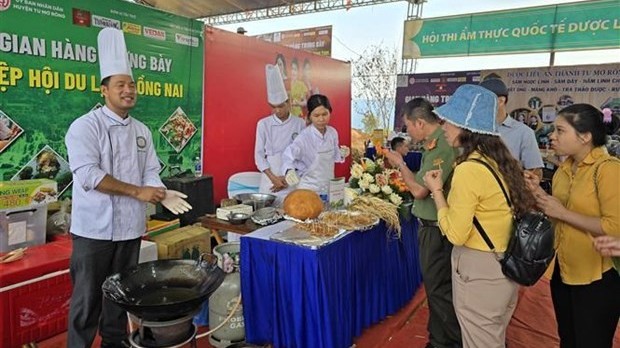
Kon Tum moves to awaken community-based tourism potential
Latest
 |
| The space of the gong culture in the Central Highlands is on the Representative List of the Intangible Cultural Heritage of Humanity. (Photo: bandantoc.kontum.gov.vn) |
Minister of Culture, Sports and Tourism Nguyen Van Hung said Kon Tum province and the Central Highlands at large are home to beautiful natural landscapes and extremely special cultural resources, both of which are favourable for tourism development.
Not only the space of the gong culture, inscribed on the Representative List of the Intangible Cultural Heritage of Humanity, but the cultural diversity of the 43 ethnic groups here will also become a particular identity of Kon Tum if the province can make use of local culture to boost tourism, he noted.
A favourable condition for community-based tourism is that residents in the Central Highlands in general and Kon Tum in particular are greatly united, sincere, and hospitable. They are the persons creating and maintaining traditional cultural values, and also the ones directly engaging in community-based tourism projects, according to the minister.
Across Kon Tum, many villages have been assisted by authorities to preserve and bring into play traditional cultural heritage to develop community-based tourism such as Kon Ktu in Dak Ro Wa commune, Kon Tum city; Bar Goc in Sa Son commune, Sa Thay district; Kon Bring in Dak Long commune, Kon Plong district; Kon Trang Long Loi in Dak Ha township, Dak Ha district; and Dak Rang in Dak Xu commune, Ngoc Hoi district.
These villages have still maintained gong playing teams, brocade weaving, the production of “ruou can” (wine drunk out of a jar through pipes), and traditional rituals. Locals have also gradually got used to welcoming tourists to their hometowns.
However, Kon Tum is also facing many difficulties in developing community-based tourism, including underdeveloped tourism infrastructure, undiversified tourism products, and a shortage of professional tourism personnel.
To address those problems and turn tourism into a key economic sector, Minister Hung held that aside from enhancing coordination among the parties concerned, it is necessary to shore up tourism in line with the Government’s resolution on economic recovery.
He recommended local authorities re-zone local tourist destinations and connect them with others across Vietnam in order to make investment for sustainable development.
Nguyen Van Binh, Director of the provincial Department of Culture, Sports and Tourism, said community-based tourism has helped give a facelift to many villages of ethnic minority groups and improve their living standards while considerably contributing to the preservation and promotion of the cultural values of local minorities.
In the coming time, Kon Tum will step up communications, especially among the young, to raise public awareness of the values of each ethnic group’s cultural identities as well as the importance of cultural preservation. It will also work to engage the entire community in the management, preservation, and promotion of traditional cultural values in tandem with tourism development, thereby helping with sustainable socio-economic development, national defence, and security safeguarding, he added.

















